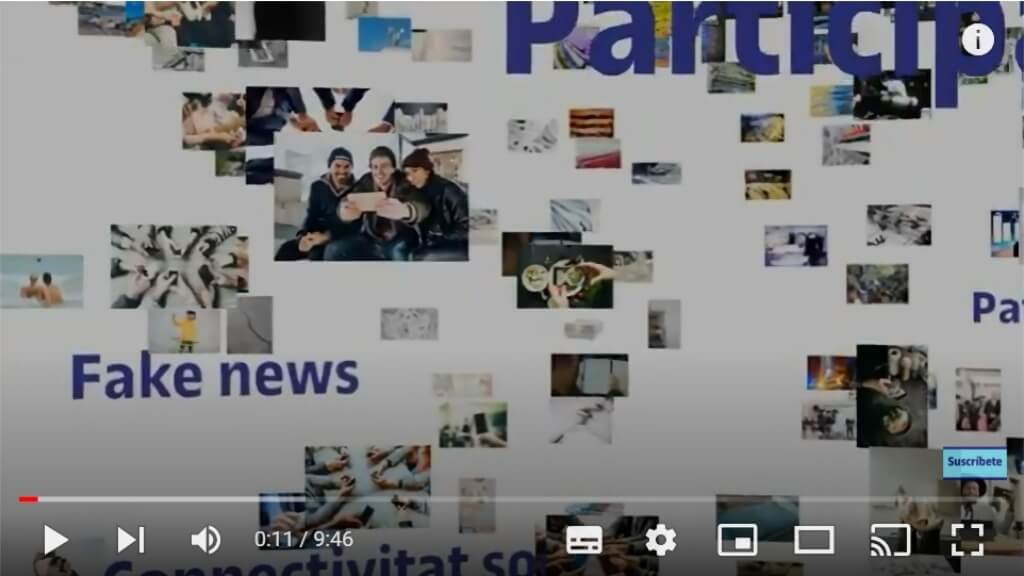IN3 releases video presenting its research on the future of the internet
This UOC research centre investigates the digital transformation of society and the impact of technology on human activityThe video presents its key figures to society: what their research involves, and why they do it

The Internet Interdisciplinary Institute (IN3) at the Universitat Oberta de Catalunya (UOC) conducts research into the digital transformation of society and provides new social and technological approaches to address the challenges of the future. Today, the research at the centre is showcased in a video that lets the principal investigators explain to society what the IN3 does, what research is carried out there and what its objectives are.
In the words of the centre's director, David Megías, who is also the principal investigator of the KISON group, when the IN3 was created more than 20 years ago it focused more on diagnosing and analysing how society was evolving than on action research. "But we're no longer satisfied with that. We also want to be part of the transformation, and design new solutions that take technology and society into account in order to address the challenges of the future."
The centre's work focuses on new technologies and how they affect all areas of human activity and society. It is made up of some 100 researchers who form 11 transdisciplinary research groups. The most recent, which joined last May, is the AID4So (Artificial Intelligence and Data for Society) group, led by Andreas Kaltenbrunner. In their laboratory, they investigate the human side of the application of new technologies, and artificial intelligence in particular. Their projects include developing a reliability index for websites that are used as sources in a joint project with the Wikimedia Foundation.
Mayo Fuster Morell, a specialist in feminist economics and the sharing economy, and the principal investigator of the DIMMONS group, explains how, since its inception, the internet has not only been a revolutionary technological tool but also an organizational metaphor. The question we have to ask ourselves is: "What digitization do we want? One which reinforces economic concentration and the concentration of power, or a digitization that reinforces democratization and which has a lot of potential in those terms?" Likewise, Rosa Borge, principal investigator of the CNSC group which studies processes of social exclusion, democratic innovations and governance in the age of technology and datafication, pointed out that "some well-designed technological tools can help in social transformation".
The 11 groups that make up the IN3 work in the fields of ICT and engineering, and humanities and social sciences. The mutual feedback between disciplines enables them to identify the unresolved problems of the network society and the challenges of ICT. Their research work sheds light on the demands and requirements that future internet technologies must meet to contribute to the progress of society, and on how society must play a central role in decisions about technological breakthroughs and their implications for human activity.
According to Ramon Ribera, the principal investigator of TURBA Lab, "the speed at which the internet has taken root in our lives is much faster than our ability to comprehend it. That's why the IN3 is working to understand what's going on at breakneck speed."
Find out about the IN3's research in more depth: https://youtu.be/7A7CYFGugxY
This dissemination action forms part of the ECT2020-000724, funded by MCIN/AEI/10.13039/501100011033 and by the European Union “NextGenerationEU”/PRTR.


UOC R&I
The UOC's research and innovation (R&I) is helping overcome pressing challenges faced by global societies in the 21st century by studying interactions between technology and human & social sciences with a specific focus on the network society, e-learning and e-health.
Over 500 researchers and more than 50 research groups work in the UOC's seven faculties, its eLearning Research programme and its two research centres: the Internet Interdisciplinary Institute (IN3) and the eHealth Center (eHC).
The university also develops online learning innovations at its eLearning Innovation Center (eLinC), as well as UOC community entrepreneurship and knowledge transfer via the Hubbik platform.
Open knowledge and the goals of the United Nations 2030 Agenda for Sustainable Development serve as strategic pillars for the UOC's teaching, research and innovation. More information: research.uoc.edu.
Press contact
-
Editorial department
